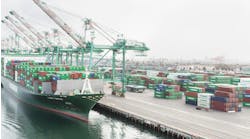Asked about his greatest concern for the European distribution market this year, Avnet’s Patrick Zammitt points to the overall economy—more specifically, the idea that anyone in the channel can do anything to change it.
“The biggest concern would be undue panic driven by macro-effects that neither we nor our customers can influence,” Zammit said, pointing instead to growing markets in Eastern Europe as good opportunities and growth areas such as renewable energies, automotive, medical, and lighting as key focuses across the continent.
“Our exposure in crisis countries like Greece and Spain is limited, but the avalanche effect could hit other markets,” added Zammit, president of Avnet Electronics Marketing EMEA. “Short-term, we even see opportunities by the weaker Euro for our very much export-oriented industry. Europe has many world market leaders in technology, many of which are our long-term customers.”
Other leading distributors in the region agree and point to their global reach and diverse product and service offerings as key benefits to performing well in tough times. Recent acquisitions by some of the industry’s largest distributors are contributing to that trend as well, expanding what many bring to the table in Europe and elsewhere. And although growth in Europe will not be as dramatic as other parts of the world, distributors still see it as a good place to be for providers of high-tech products and services.
“Europe in total will not grow as dramatically over the years as, for example, Asia, but it will become more and more a distribution market,” Zammit explained. “In summary, it is a healthy place to be from a technology perspective and will continue to be.”
Expansion Strategies
A good 2011 has made comparisons even tougher to make this year, as some companies saw sales declines in Europe during the first few months of 2012.Following record sales in the region in 2011, Avnet, for instance, saw sales drop 15% in its components division during the first three months of 2012. But as Zammit explained, the outlook is a bit better.
“As we came from an absolute record year with calendar 2011—the first two quarters of [calendar year 2011] were an all-time high—it is natural that with the slowdown that began last summer, Q1 [for calendar year 2012] was lower. We saw the first quarter at –15% for Europe,” Zammit said, referring to the components market only. He also said that industry analysts call the outlook “much prettier,” with slightly negative to flat expectations.
The spring quarter reflected slower growth for other top distributors in the region, with United Kingdom-based Electrocomponents plc—parent company to RS Components and its North American counterpart Allied Electronics—reporting results in line with the same period in 2011.Reporting on its fiscal first quarter ended June 30, 2012, Electrocomponents said its international business declined 2% while the U.K. grew 5%, 2% of which was due to sales of the highly sought Raspberry Pi computer.
Within the international segment, continental Europe grew just 1%, North America declined 4%, and Asia declined 3% during the quarter. Electrocomponents cited last year’s strong performance and this year’s challenging economic climate as key factors. Electrocomponents’ sales grew 7% in fiscal 2011, to a record 1.3 billion pounds (roughly $2 billion).
“Sales are at a similar level to last year despite strong comparators and a challenging economic environment. We are mindful of the macroeconomic environment and, as we have demonstrated in previous years, we are able to respond quickly to changing conditions,” Electrocomponents’ group chief executive Ian Mason said.
“We are well-positioned compared to the numerous, smaller distributors against whom we primarily compete, who do not have the advantage of our global scale and reach. We are therefore continuing to invest in our strategic priorities to leverage these advantages,” he said.
One of those priorities is the company’s e-commerce business, which continues to grow. The distributor increased its e-commerce revenues by 18% last year, with online business now representing 54% of sales. A new IT system for Allied Electronics in North America and upgraded systems for RS in the U.K. and Europe, all completed in fiscal 2011, are helping boost service levels and improve efficiency.
Among the company’s most recent technology announcements, RS launched a new online line card this summer covering the company’s more than 550,000 products. The service allows customers to search by brand faster, cutting their search-to-order time. The simplified process is yet another step in RS’s goal to build its online business, company officials said.
Fellow U.K.-based distributor Premier Farnell announced recent online enhancements as well, updating its search and design tool, the Knode, with better navigation, improved search capabilities, a “My List” feature that allows users to store and share information, and a host of new content and resources for embedded design.
The company’s recent acquisition of Shenzhen Embest Technology Co. Ltd. is part of that strategy. Based in China, Embest provides embedded system development boards and tools, as well as design engineering services. Embest will support Premier Farnell customers around the world through the distributor’s element14 platform and the Knode.
“This deal connects our component and board-level portfolio with Embest’s expanded offering in systems-level solutions, including embedded software, embedded OS [operating system], and hardware development,” said Laurence Bain, Premier Farnell’s chief executive officer.
“We are now in a unique position to offer our global customers complete solutions from concept definition and design start through to prototype. These capabilities are particularly attractive to our supplier partners, who are focused on attracting customers at the start of the design cycle,” he said.
Digging Deeper, Reaching Further
Avnet EMEA is also expanding with acquisitions, announcing in July its purchase of Altron GmbH & Co. KG, a leading interconnect, passive, and electromechanical components (IP&E) distributor in Germany. The deal expands Avnet’s passives business in the region and affirms its commitment to building its European IP&E business.
Altron represents more than 40 suppliers and had roughly $30 million in sales in 2011. The deal is especially noteworthy because Germany, with its strong industrial base, remains the center of the European components distribution market, representing about a third of the total market, according to Zammit.
“The acquisition of Altron is another example of Avnet’s commitment to invest in the European IP&E market. By acquiring Altron, together with our IP&E business unit Avnet Abacus, we will gain more critical mass in Germany and create cross-selling opportunities to the combined customer base,” Zammit said. Avnet Abacus is Avnet’s pan-European demand creation distributor specializing in interconnect, passive, electromechanical, power supply, and battery products.
But Zammit also noted that Avnet EMEA’s growth strategy in Europe is multi-pronged. The company doesn’t just follow geographical trends, but technical and vertical ones as well. That’s where engineering experts and logistical solutions come into play—areas of increasing importance as distributors look to gain market share in an increasingly competitive environment.
“Over 350 engineering specialists help customers design globally competitive products. Logistically, we support customers in optimizing their supply chain regardless of their location in Europe. Our supply chain experts help customers to reengineer their materials management and bound working capital by introducing replenishment concepts or forecasting mechanisms,” Zammit said. “In this way, we have been able to achieve market share beyond 40% in all major regions in Europe.”
Continuing on that path will likely take even more effort as the European economic outlook remains uncertain. Unexpected gains in industrial production in the U.K., Italy, and Sweden this spring were tempered by bigger than expected declines in France and Greece, leaving many observers focused on the ongoing debt crisis and weakening global economic picture. In a forecast released in July, the International Monetary Fund predicted that the global economy will grow more slowly over the next few years and that Europe’s financial crisis and the potential budget crisis in the U.S. could slow growth even further.
|
Mouser Continues Growth in Europe Tough economic conditions in Europe aren’t holding Mouser Electronics back as the distributor continues to grow its presence in the region. The company reported double-digit growth in the region over the summer along with an optimistic outlook for the remainder of the year. The Texas-based electronic components distributor has invested heavily in Europe over the last two years, adding offices and staff in Germany, the Czech Republic, the Netherlands, Spain and Sweden and expanding existing operations in France, Italy, Israel and the United Kingdom. The efforts have yielded roughly 20% growth in Europe through the first half of the year. “By adding more resources and staff members in Europe, we have helped drive further growth over an amazing 2010-2011,” Mark Burr-Lonnon, Mouser’s vice president of EMEA business said in a statement announcing the results this week. “We’ve seen around 20% further growth in 2012 and gaining momentum each month, solidifying us as a key player in the European market. No question about it, 2012 is proving to be another great year for Mouser, especially bearing in mind the slowing of the market.” The growth so far this year follows more than 40% growth in the market last year, Burr-Lonnon added. Mouser credits its local headquarters in Munich and its Web efforts throughout the region as key drivers of the new business. Germany remains the center of the electronics market in Europe, and the Web is making it easier for distributors to deliver even more information and services to design engineers and procurement professionals around the world. Burr-Lonnon said the Web accounts for 75% of all new accounts and 50% of sales in Europe. The company touts its user-friendly online catalogs, mobile apps, advanced search capabilities, intelligent Bill of Materials (BOM) tool, local technical support, and service via 17 languages and currencies as key online attributes. Mouser is also expanding elsewhere around the world, announcing key moves in Asia recently. The distributor grew its presence in China by incorporating in the country this year and putting roughly 50 people in place to provide marketing and customer support to local design engineers and purchasers. Mouser also began accepting local currency in China this year and is conducting online transactions in the Chinese Renminbi as well as accepting UnionPay’s China Pay e-payment service, the country’s government-backed inter-bank transfer network and Chinese bank card organization. Both moves offer more seamless transactions to local customers |








